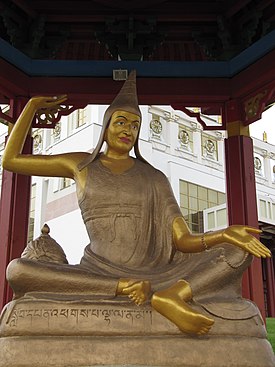Our website is made possible by displaying online advertisements to our visitors.
Please consider supporting us by disabling your ad blocker.
Aryadeva

| Part of a series on |
| Buddhism |
|---|
 |

Āryadeva (fl. 3rd century CE) (IAST: Āryadeva; Tibetan: འཕགས་པ་ལྷ་, Wylie: 'phags pa lha, Chinese: 提婆 菩薩 Tipo pusa meaning Deva Bodhisattva), was a Mahayana Buddhist monk, a disciple of Nagarjuna and a Madhyamaka philosopher.[1] Most sources agree that he was from "Siṃhala", which some scholars identify with Sri Lanka.[1] After Nagarjuna, he is considered to be the next most important figure of the Indian Madhyamaka school.[2][3]
Āryadeva's writings are important sources of Madhyamaka in East Asian Buddhism. His Catuḥśataka (Four Hundred Verses) was influential on Madhyamaka in India and China and his *Śataka (Bailun, 百論, T. 1569) and Dvādaśamukhaśāstra (both translated by Kumārajīva in the 4th century) were important sources for the East Asian Madhyamaka school.[1] Āryadeva is also known as Kanadeva, recognized as the 15th patriarch in Chan Buddhism and some Sinhalese sources also mention an elder (thera) called Deva which may also be the same person.[1] He is known for his association with the Nalanda monastery in modern-day Bihar, India.[4]
- ^ a b c d Silk, Jonathan A. (ed.) (2019). Brill’s Encyclopedia of Buddhism Volume II:Lives, pp. 60-68. Brill.
- ^ Ruegg (1981), p. 50.
- ^ Women of Wisdom by Tsultrim Allione, Shambhala Publications Inc, p. 186.
- ^ Niraj Kumar; George van Driem; Phunchok Stobdan (18 November 2020). Himalayan Bridge. KW. p. 253. ISBN 978-1-00-021549-6.
Previous Page Next Page


